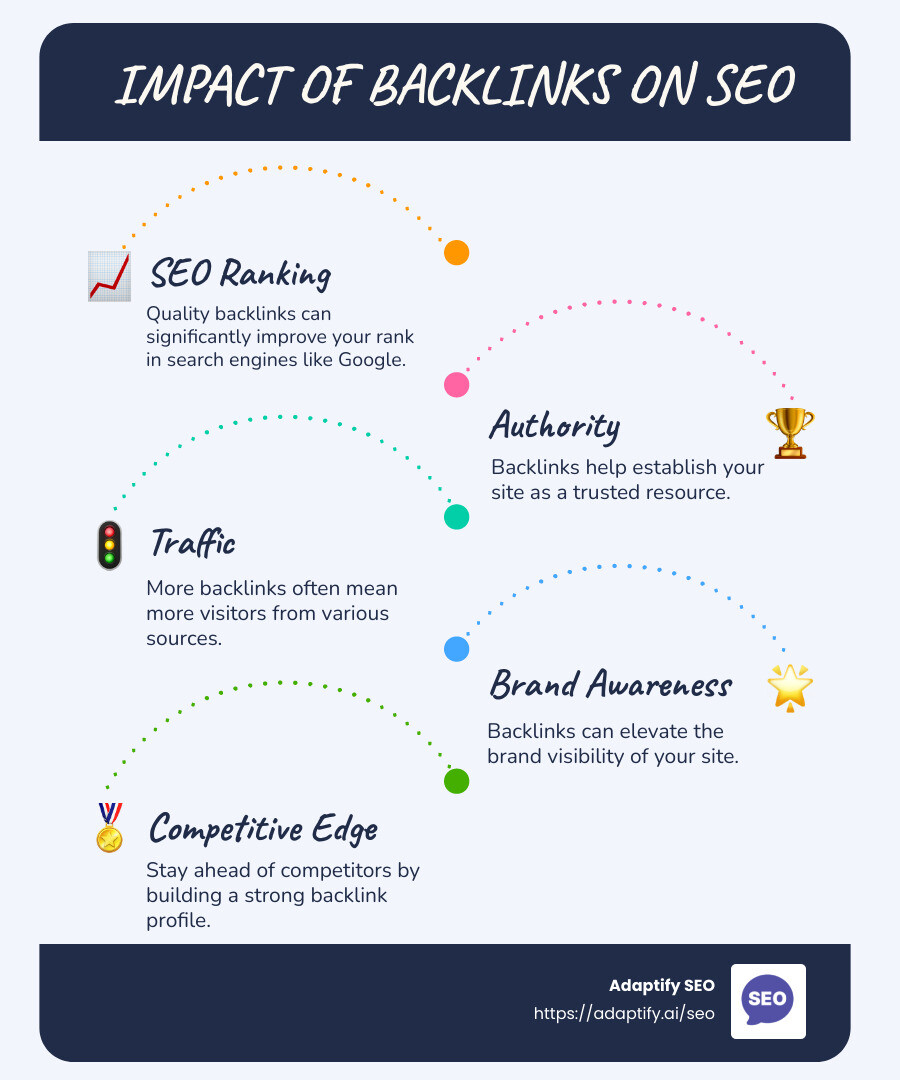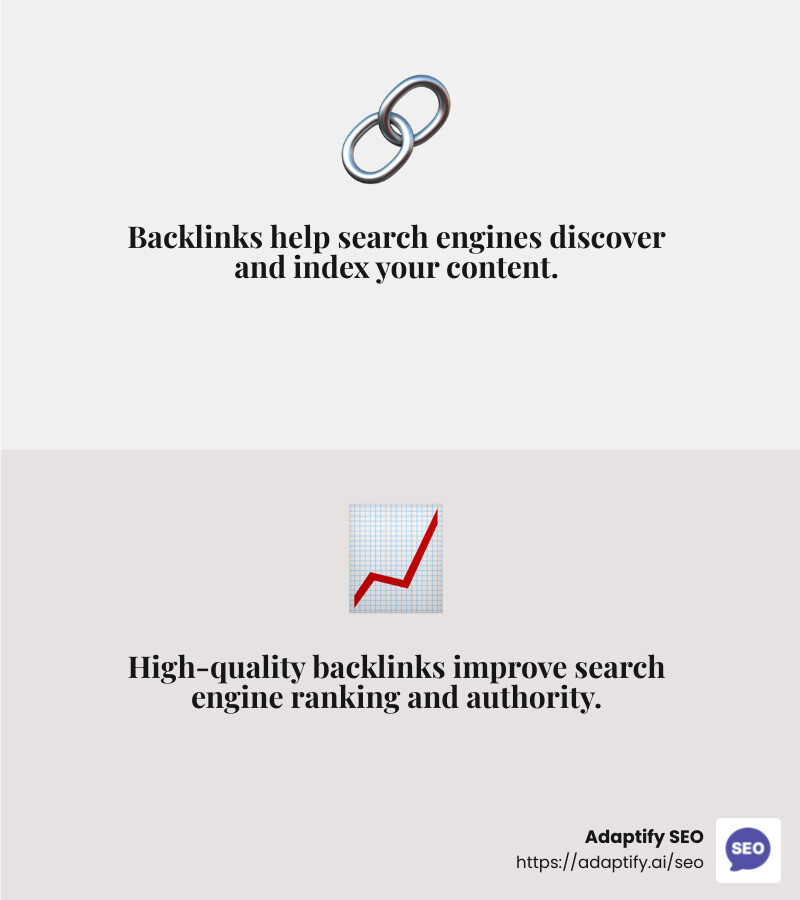Backlinks Explained: How They Impact Your SEO
Hansjan Kamerling
Sep 13

Understanding Backlinks: A Key to Boosting Your SEO
Back links are one of the fundamental components of Search Engine Optimization (SEO). But what exactly are back links and why should you care?
Simply put, back links are links from one website to another. Think of them as votes of confidence. When a site links to your content, it vouches for its quality and relevance.
Why should you care about back links?
- SEO Ranking: Quality back links can significantly improve your rank in search engines like Google.
- Authority: They help establish your site as a trusted resource.
- Traffic: More back links often mean more visitors from various sources.
These reasons are why back links are crucial for any successful SEO strategy.
My name is Hansjan Kamerling, and I've spent years helping businesses understand and use back links to improve their SEO. From working with top AI startups to helping viral communities grow, I’ve seen how effective back links can lift a site's online presence.

What Are Backlinks?
Backlinks—also known as inbound links or incoming links—are links from one website to another. They play a crucial role in how search engines like Google rank websites.
The Anatomy of a Backlink
Backlinks are made up of HTML code. Here’s a simple example of what a backlink looks like in HTML:
<a href="https://www.bighedgehogmap.org/">hedgehog map</a>
Let’s break this down:
<a>: This stands for "anchor," which is the HTML tag used to create links.href="https://www.bighedgehogmap.org/": This part specifies the URL the link points to.hedgehog map: This is the anchor text, the clickable part of the link that users see.</a>: This closes the anchor tag.
Example: British Hedgehogs
Imagine a website dedicated to British hedgehogs. This site might have a page about a hedgehog awareness drive and link to a helpful resource like a hedgehog sighting map. In this case, the hedgehog map receives a backlink from the British hedgehog site.

Anchor text is the clickable text in a hyperlink. In our example, "hedgehog map" is the anchor text. The anchor text is important because it gives both users and search engines an idea of what the linked page is about.
Creating Backlinks Without HTML
Most Content Management Systems (CMS) make it easy to create backlinks without needing to know HTML. You can usually highlight the text you want to link, click a link icon, and paste in the URL. This automatically generates the HTML code for you.
Why Backlinks Matter
Backlinks are essential for two main reasons:
- Findy by Searchers: Links help users steer the web, leading them to your site. The more backlinks you have, the higher the chances people will find your content.
- Search Engine Crawling and Indexing: Search engines use bots to crawl the web. These bots follow backlinks from one page to another, finding new content and indexing it. Without backlinks, search engines might not find your pages, making them invisible in search results.

Pro Tip: When creating content, focus on earning organic backlinks by producing high-quality, valuable content that others naturally want to link to.
Conclusion
Understanding what backlinks are and how they work is the first step in leveraging them to boost your SEO. In the next section, we'll explore the different types of backlinks and how they impact your site's authority and ranking.
Why Are Backlinks Important?
Backlinks are crucial for several reasons, especially when it comes to SEO.
Search Engine Crawling and Indexing
Search engines like Google use bots, often called "crawlers" or "spiders," to steer the web. These bots follow backlinks from one page to another. When a bot finds a backlink to your site, it crawls your page and adds it to the search engine's index. Without these links, search engines might not find your content, making it nearly invisible in search results.
Ranking Signal
Backlinks act as a significant ranking signal. Think of them as votes of confidence from other websites. The more high-quality backlinks you have, the stronger your site's authority appears to search engines. This boosts your ranking in SERPs (Search Engine Results Pages).
Authority and E-E-A-T
Google uses the concept of E-E-A-T (Expertise, Authoritativeness, and Trustworthiness) to evaluate the quality of content. Backlinks from reputable sites improve your E-E-A-T score, making your site appear more credible and authoritative.
For instance, a backlink from a high-authority site can significantly boost your site's authority. Google sees this as a strong endorsement, helping you rank higher in search results.
Competitive Intelligence
Analyzing your competitors' backlinks can provide valuable insights. Tools like Semrush and Ahrefs allow you to see where your competitors are getting their backlinks. This can help you identify new opportunities for your own link-building strategy.
Direct Traffic and Brand Awareness
Backlinks can also drive direct traffic to your site. When users click on these links, they are taken straight to your content. This not only increases your site's traffic but also boosts brand awareness, drawing in a broader audience organically.
Real-World Example
A study we conducted showed that pages with high-quality backlinks consistently ranked higher in Google search results. In another study, pages that lacked backlinks struggled to gain any organic traffic. This reinforces the importance of backlinks in your overall SEO strategy.
Conclusion
Backlinks are more than just a ranking factor; they are vital for search engine crawling, indexing, and establishing your site's authority. In the next section, we'll dive into the different types of backlinks and how they impact your site's performance.
Types of Backlinks
Backlinks come in various forms, each with its own impact on your SEO. Let's break down the main types:
Dofollow Links
Dofollow links are the gold standard in backlinks. They pass on "link juice," which is a term for the SEO value from one site to another. These links signal to search engines that the linked content is credible and worth ranking higher.
For example, a dofollow link from a reputable site like Forbes can significantly boost your site's authority.
Nofollow Links
Nofollow links include an attribute in their HTML code (
rel="nofollow") that tells search engines not to pass on link equity. While they don't directly impact SEO, they still have value. They can drive traffic and increase brand awareness.Typical sources of nofollow links include:
- Blog comments
- Press releases
- Paid advertisements
Sponsored Links
Sponsored links use the
rel="sponsored" attribute to indicate that a link is part of a paid advertisement or sponsorship. These links don't pass on SEO value but are important for transparency and compliance with Google's guidelines.UGC Links
UGC links (User-Generated Content) use the
rel="ugc" attribute. These are links found in user-generated content such as forum posts and comments. While they don't pass link equity, they can still drive traffic and engagement.Good Links vs. Bad Links
Not all backlinks are created equal. Here’s a quick guide:
Good Links:
- Come from high-authority, reputable sites
- Are placed naturally within relevant content
- Use natural, varied anchor text
Bad Links:
- Come from low-quality or spammy sites
- Are part of link schemes or exchanges
- Use overly optimized anchor text
Google Webmaster Guidelines
Google has strict rules about what constitutes acceptable link-building practices. Violating these guidelines can lead to penalties, which can hurt your site's rankings. Here are some practices to avoid:
- PBNs (Private Blog Networks): Multiple sites linking together to manipulate rankings.
- Paid Links: Exchanging money, goods, or services for links.
- Link Exchanges: "You link to me, and I'll link to you" arrangements.
- Automated Links: Using software to generate large volumes of links.
- Forum and Comment Spam: Adding spammy links in forums and comments.
Following these guidelines ensures that your backlink strategy is both effective and compliant with search engine rules.
In the next section, we'll explore strategies to get high-quality backlinks that can boost your site's performance.
How to Get High-Quality Backlinks
Getting high-quality backlinks is crucial for improving your site's SEO. Here are some effective strategies to help you attract those valuable links.
Strategies to Get High-Quality Backlinks
- Become a Source for Reporters and Bloggers
Services like Help a B2B Writer connect you with journalists and bloggers who need expert sources. By providing valuable insights, you can earn backlinks from authoritative news sites.
Example: An expert used a now-defunct platform, HARO, to answer a query about graphic design and earned a backlink from a high-authority university site.
- Publish “Skyscraper” Content
The Skyscraper technique involves finding popular content in your niche and creating something even better. For instance, a comprehensive list of SEO tools can attract numerous backlinks.
Steps:
- Find high-performing content.
- Create a more detailed and valuable version.
- Promote it to get backlinks.
- Build Links from Outdated Resources
Identify outdated resources in your industry and create updated versions. Then, reach out to sites linking to the old content and suggest they link to your new, updated resource.
- Use Content Formats Proven to Generate Links
Certain content formats, like infographics, videos, and listicles, are more likely to attract backlinks. For example, list-based articles are highly shareable and often become backlink magnets.
- Publish Ultimate Guides
Ultimate guides are comprehensive resources on a specific topic. They tend to attract backlinks because they cover everything someone needs to know in one place.
- Use Branded Strategies and Techniques
Develop and name unique strategies or techniques. This makes them memorable and more likely to be referenced by others.
- Authority Resource Pages
Create a resource page that lists valuable tools, articles, and guides in your industry. These pages are often linked to by other sites as a comprehensive resource.
- Press Releases
Write and distribute press releases about newsworthy events or research related to your business. This can help attract attention and backlinks from the media.
- Recover Broken Backlinks
Use tools to find broken backlinks pointing to your site. Contact the referring domains and suggest updating the link to a relevant, functional page on your site.
- Competitor Analysis
Analyze your competitors’ backlinks using tools. Identify opportunities where you can get similar backlinks by reaching out to the same sites or creating better content.
By implementing these strategies, you can attract high-quality backlinks that boost your site's authority and improve your SEO performance.
Next, we'll dive into how backlinks impact your SEO performance.
Backlinks and SEO Performance
Backlinks are essential for your SEO performance because they impact several key areas: Google rankings, findability, referral traffic, brand awareness, authority score, domain authority, and page authority.
Google Rankings
Google uses backlinks as a significant ranking factor. Think of backlinks as votes of confidence from other websites. The more high-quality backlinks you have, the more Google trusts your site. This trust translates into higher rankings on search engine results pages (SERPs). For example, top-ranking pages for competitive keywords often have thousands of backlinks from reputable sources.
Findability
Backlinks help Google find new pages on your site. When a high-authority site links to your new blog post, Google's crawlers follow that link and index your content faster. This improves your chances of ranking sooner and reaching a broader audience.
Referral Traffic
Not all traffic comes from search engines. Backlinks can drive significant referral traffic to your site. If a popular blog or news site links to your content, their readers might click through to your site. This can result in a steady stream of visitors, boosting your overall traffic.
Brand Awareness
Every backlink is an opportunity for brand exposure. When your content is linked by authoritative sites, it gets in front of a new audience. Over time, this builds your brand's reputation and awareness. For instance, being mentioned on Forbes can significantly improve your brand's credibility.
Authority Score
Your site's authority score is influenced by the quality and quantity of backlinks. Tools like Semrush use authority scores to gauge the overall strength of your backlink profile. Higher scores generally mean better SEO performance, as they indicate a robust and trustworthy site.
Domain Authority
Domain authority (DA) measures the overall strength of your website's backlink profile. It's calculated on a logarithmic scale from 0 to 100. Higher DA means your site has a strong backlink profile compared to others. This metric helps you understand your site's competitive standing and is crucial for ranking in competitive niches.
Page Authority
Page authority (PA) is similar to domain authority but focuses on individual pages. High PA indicates that a specific page has a strong backlink profile. For example, a well-linked blog post will have a higher PA, making it more likely to rank well in search results.
In summary, backlinks are more than just links; they're powerful signals that influence your site's SEO in multiple ways. Next, we'll explore the tools you can use for backlink analysis to ensure you're on the right track.
Tools for Backlink Analysis
Analyzing your backlinks is crucial for understanding and improving your SEO performance. Several tools can help you gain insights into your backlink profile and those of your competitors. Here are some of the most effective ones:
Google Search Console
Google Search Console (GSC) is a free tool that gives you an overview of your site's backlink profile. It shows:
- Top linked pages: Pages on your site with the most backlinks.
- Top linking sites: Sites that link to you the most.
- Top linking text: Common anchor texts used in your backlinks.
You can export these reports as a CSV file for further analysis.
Moz Pro
Moz Pro offers a suite of tools for backlink analysis. The Link Explorer tool is particularly useful. It helps you:
- See backlinks to any page.
- Research competitors’ backlink profiles.
- Identify spammy links to your site.
Moz Pro also provides metrics like Page Authority and Domain Authority, which measure the strength of your backlink profile.
Ahrefs
Ahrefs is known for its comprehensive backlink analysis capabilities. With Ahrefs, you can:
- Track new and lost backlinks.
- Analyze anchor text distribution.
- See the top pages linked to your site.
- Identify broken backlinks.
Ahrefs' Site Explorer provides a detailed look at your backlink profile and helps you uncover link building opportunities.
Backlink Analytics
Tools like Backlink Analytics provide in-depth analysis of your backlinks. You can see metrics like:
- Authority Score
- Referring domains
- Backlinks
- Monthly visits
- Organic Traffic
These metrics help you understand the quality and impact of your backlinks.
Link Explorer
Moz's Link Explorer is another excellent tool for backlink analysis. It allows you to:
- See backlinks to any page.
- Research competitors’ backlink profiles.
- Identify spammy links.
Moz also offers metrics like Page Authority and Domain Authority to gauge the strength of your backlink profile.
Backlink Audit
The Backlink Audit tool helps you find and fix potentially harmful backlinks to your site. It analyses your backlink profile and identifies toxic links that could hurt your SEO. You can then disavow these links to prevent any negative impact.
Backlink Gap
The Backlink Gap tool allows you to compare your backlink profile with up to four competitors. This helps you identify new link building opportunities by finding sites that link to your competitors but not to you.
Link Building Tool
The Link Building Tool manages the entire link building process. It provides contact information for target websites and allows you to connect your email for outreach. You can monitor your progress and see when you earn backlinks.
Using these tools will help you build a strong backlink profile, essential for improving your SEO performance. Next, we'll answer some frequently asked questions about backlinks.
Frequently Asked Questions about Backlinks
What is an example of a backlink?
A backlink is a link from one website to another. For instance, if Forbes writes an article and includes a link to your website, that’s a backlink for you. Backlinks are important because they act as votes of confidence from one site to another, signaling to search engines that your content is valuable and credible.
How do I get SEO backlinks?
Getting SEO backlinks involves several strategies:
- Reporters and Bloggers: Becoming a source for reporters and bloggers is a great way to earn backlinks. Services like Help a Reporter Out (HARO) connect journalists with expert sources. If you provide valuable insights, you could earn a backlink in their articles.
- Skyscraper Content: Create content that is significantly better than existing content on the same topic. This method, known as the Skyscraper Technique, involves finding popular content, improving upon it, and promoting your superior version to those who linked to the original.
- Outdated Resources: Find outdated resources in your industry and offer updated content to webmasters. They might replace the old link with a link to your updated resource.
- Ultimate Guides and List-Based Articles: Comprehensive guides and list-based articles are highly shareable and often attract backlinks. For example, creating an "Ultimate Guide to Backlinks" can position your content as a valuable resource.
Each of these strategies can help you build high-quality backlinks that boost your SEO.
Is it illegal to buy backlinks?
Buying backlinks is against Google's Webmaster Guidelines. Google considers paid links as an attempt to manipulate search rankings, which can result in penalties. These penalties can severely impact your search engine rankings, making it harder for users to find your site.
Instead, focus on earning backlinks through legitimate methods like creating high-quality content, engaging with your community, and building relationships with other site owners. This approach is not only safer but also more sustainable in the long term.
Conclusion
At Adaptify.ai, we understand the importance of backlinks in boosting your SEO performance. Our automated SEO services are designed to streamline the entire process, from strategy formulation to content creation and PR link building.
Strategy Formulation: Our AI-powered platform helps you develop a comprehensive SEO strategy custom to your needs. By analyzing current trends and your competitors, we ensure that your strategy is always up-to-date and effective.
Content Creation: High-quality content is the backbone of any successful SEO campaign. Adaptify.ai automates the content creation process, ensuring that your content is optimized for search engines and engaging for readers. We use advanced algorithms to generate content that is both informative and shareable, increasing your chances of earning valuable backlinks.
PR Link Building: Public relations is a crucial component of link building. Our platform connects you with journalists and bloggers who are looking for expert sources. By providing valuable insights, you can earn backlinks from authoritative news sites and blogs, boosting your site's credibility and search engine rankings.
AI and Efficiency: What sets Adaptify.ai apart is our use of artificial intelligence to automate and improve SEO processes. This reduces manual effort, allowing you to focus on other aspects of your business. Our AI ensures that every step, from keyword research to backlink analysis, is executed with precision and efficiency.
In summary, Adaptify.ai offers a comprehensive solution to your SEO needs. By leveraging our automated services, you can improve your website's authority, increase traffic, and achieve better search engine rankings with less effort.
Ready to take your SEO to the next level? Sign up for Adaptify.ai today and see how our automated solutions can transform your digital marketing strategy.

